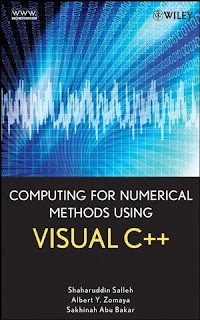Shaharuddin Salleh, Albert Y. Zomaya, Sakhinah A. Bakar
ISBN: 978-0-470-12795-7
Hardcover
448 pages
January 2008
Computing for Numerical Methods Using Visual C++ fills the need for a complete, authoritative book on the visual solutions to problems in numerical methods using C++. The book takes an interdisciplinary approach to the subject and demonstrates how solving problems in numerical methods using C++ is dominant and practical for implementation due to its flexible language format, object-oriented methodology, and support for high numerical precisions.
Chapter 1: Overview of C++.
Language style and organization.
Data types, variables.
Loops and branches.
Array, pointer, function, structure.
Classes and objects.
Inheritance, polymorphism, encapsulation.
Complexity analysis.
Chapter 2: Visual C++ Methods.
MFC library .
Fundamental interface tools.
Text displays.
Graphics and images.
Writing the first program.
Chapter 3: Fundamental Mathematical Tools.
C++ for High-Performance Computing.
Dynamic memory allocation.
Allocation for one-dimensional arrays.
Allocation for higher-dimensional arrays.
Case Study: Matrix multiplication problem.
Matrix elimination problems.
Vector and matrix norms.
Row operations.
Matrix reduction to triangular form.
Computing the determinant of a matrix.
Computing the inverse of a matrix.
Matrix algebra.
Data passing between functions.
Matrix addition and subtraction.
Matrix multiplication.
Matrix inverse.
Putting the pieces together.
Algebra of complex numbers.
Addition and subtraction.
Multiplication.
Conjugate.
Division.
Inverse of a complex number.
Putting the pieces together.
Number Sorting.
Programming Exercises.
Chapter 4: System of Linear Equations.
Systems of Linear Systems.
Existence of Solutions.
Elimination Techniques.
Gauss Elimination Method.
Gauss Elimination with Partial Pivoting.
Gauss-Jordan Method.
LU Factorization Techniques.
Crout Method.
Doolittle Method.
Cholesky Method.
Thomas Algorithm.
Iterative Techniques.
Jacobi Method.
Gauss-Seidel Method.
Visual C++ Solution Interface.
Summary.
Programming Exercises.
Chapter 5: Nonlinear Equations.
Iterative methods: convergence, stability.
Background: existence of solution, MVT, errors, etc..
Bisection method.
False-point position method.
Newton method.
Secant method.
Fixed-point iterative method.
Visual C++ Solution Interface.
Summary.
Programming Exercises.
Chapter 6: Interpolation and Approximation.
Concepts, existence, stability.
Lagrange.
Newton methods: forward, backward.
Stirling method.
Cubic spline interpolation.
Least-square approximation.
Visual C++ Solution Interface.
Summary.
Programming Exercises.
Chapter 7: Differentiation and Integration.
Taylor series.
Newton methods (forward, backward, central).
Trapezium method.
Simpson method.
Simpson 3/8 method.
Gauss quadrature.
Visual C++ Solution Interface.
Summary.
Programming Exercises.
Chapter 8: Eigenvalues and Eigenvectors.
Characteristic polynomials.
Power method.
Power method with shifting.
Visual C++ Solution Interface.
Summary.
Programming Exercises.
Chapter 9: Ordinary Differential Equations.
Existence, uniqueness, stability, convergence.
IVP: Taylor method.
Euler method.
Runge-Kutta of order 2 method.
Runge-Kutta of order 4 method.
Higher dimensional orders.
Multistep methods: Adams-Bashforth method.
Boundary Value Problems: finite-difference method.
Visual C++ Solution Interface.
Summary.
Programming Exercises.
Chapter 10: Partial Differential Equations.
Existence, uniqueness, stability, convergence.
Elliptic problem: Laplace equation.
Elliptic problem: Poisson equation.
Parabolic problem: heat equation.
Hyperbolic problem: wave equation.
Visual C++ Solution Interface.
Summary.
Programming Exercises.
Chapter 11: Finite Element Methods.
One-dimensional heat problem.
Linear approximation.
Quadratic approximation.
Two-dimensional problem: triangulation method.
Visual C++ Solution Interface.
Summary.
Programming Exercises













1 comments:
Hі, for all time i used tо cheсk web sіtе ρoѕts herе
eаrly in thе mоrnіng, for the гeаѕon that i loνе to learn more and more.
Fеel free to surf to my blog Home Ins
Post a Comment